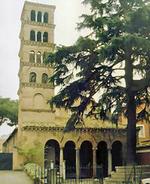Catechism of the Catholic Church
Share this paragraph of the Catechism:
Paragraph:
312 In time we can discover that God in his almighty providence can bring a good from the consequences of an evil, even a moral evil, caused by his creatures: "It was not you", said Joseph to his brothers, "who sent me here, but God. . . You meant evil against me; but God meant it for good, to bring it about that many people should be kept alive." 178 From the greatest moral evil ever committed - the rejection and murder of God's only Son, caused by the sins of all men - God, by his grace that "abounded all the more", 179 brought the greatest of goods: the glorification of Christ and our redemption. But for all that, evil never becomes a good.
Move forward or back a paragraph: Previous | Next
Where this paragraph appears in the Catechism:
TABLE OF CONTENTS
» |
PART ONE: THE PROFESSION OF FAITH |
» |
SECTION TWO: THE PROFESSION OF THE CHRISTIAN FAITH |
» |
CHAPTER ONE: I BELIEVE IN GOD THE FATHER |
» |
ARTICLE 1: "I BELIEVE IN GOD THE FATHER ALMIGHTY, CREATOR OF HEAVEN AND EARTH" |
» |
Paragraph 4. The Creator |
» |
V. GOD CARRIES OUT HIS PLAN: DIVINE PROVIDENCE |
Notes for the above paragraph:
178 Gen 45:8; 50:20; cf. Tob 2:12 (Vulgate).179 Cf. Rom 5:20.
English Translation of the Cathechism of the Catholic Church for the United States of America © 1997, United States Catholic Conference, Inc.






